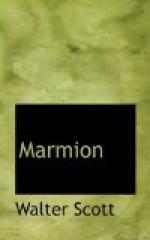line 15. The rowan is the mountain ash. One of the most tender and haunting of Scottish songs is Lady Nairne’s ’Oh, Rowan tree!’—
‘How fair wert
thou in summer time, wi’ a’ thy clusters
white,
How rich and gay
thy autumn dress, wi’ berries red and
bright.’
line 27. There are some notable allusions in the poets to the moonlight baying of dogs and wolves. Cp. Julius Caesar, iv. 3. 27:—
‘I had rather be a dog and bay the moon.’
See also Shield’s great English song, ’The Wolf’:—
’While the wolf,
in nightly prowl,
Bays the moon
with hideous howl!’
One of the best lines in English verse on the wolf—both skilfully onomatopoeic and suggestively picturesque—is Campbell’s, line 66 of ’Pleasures of Hope’:—
‘The wolf’s long howl from Oonalaska’s shore.’
line 30. Cp. the movement of this line with line 3 in ’Sang of the Outlaw Murray’:—
‘There’s hart and hynd, and dae and rae.’
line 31. ‘Grene wode’ is a phrase of the ‘Robyn Hode Ballads.’ Cp.:- -
’She set her on
a gode palfray,
To grene
wode anon rode she.’
line 32. The ruins of Newark Castle are above the confluence of the Ettrick and the Yarrow, on the latter river, and a few miles from Selkirk. Close by is Bowhill, mentioned below, 73. See Prof. Minto’s ‘Lay of the Last Minstrel’ (Clarendon Press), pp. 122-3. In the days of the ‘last minstrel’ it was appropriate to describe this ‘riven’ relic as ‘Newark’s stately tower.’
line 33. James ii built Newark as a fortress.
line 41. The gazehound or greyhound hunts by sight, not scent. The Encyclopedic Dictionary quotes Tickell ’On Hunting’:—
’See’st thou the gazehound!
how with glance severe
From the close herd he marks the destined deer.’
line 42. ’Bratchet, slowhound.’—Scott. The older spelling is brachet (from Brach or BRACHE), as:—
‘BRACHETES bayed that best,
as bidden the maystarez.’
Sir Gaw. and the
Green Knyght,
1603.
In contrast with the gazehound the brachet hunts by scent.
line 44. Cp. Julius Caesar, iii. I. 273, ‘Let slip the dogs of war.’
line 48. Harquebuss, arquebus, or hagbut, a heavy musket. Cp. below, V. 54.
line 49. Cp. Dryden’s ‘Alexander’s Feast,’ ‘The vocal hills reply.’
line 54. Yarrow stream is the ideal scene of Border romance. See the Border Minstrelsy, and cp. the works of Hamilton of Bangour, John Leyden, Wordsworth’s Yarrow poems, the poems of the Ettrick Shepherd, Prof. Veitch, and Principal Shairp. John Logan’s ’Braes of Yarrow’ also deserves special mention, and many singers of Scottish song know Scott Riddell’s ‘Dowie Dens o’ Yarrow.’
line 61. Holt, an Anglo-Saxon word for wood or grove, has been a favourite with poet’s since Chaucer’s employment of it (Prol. 6):—




